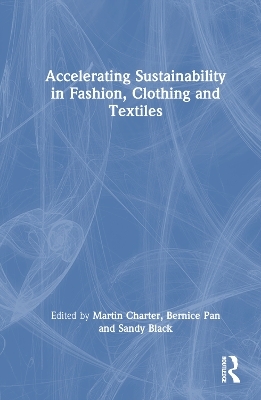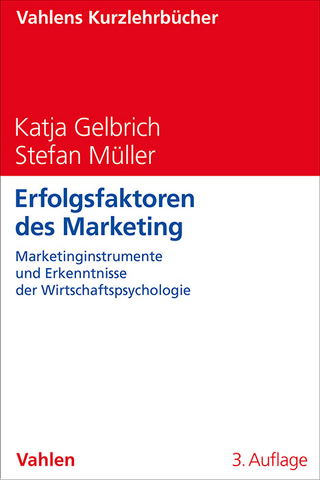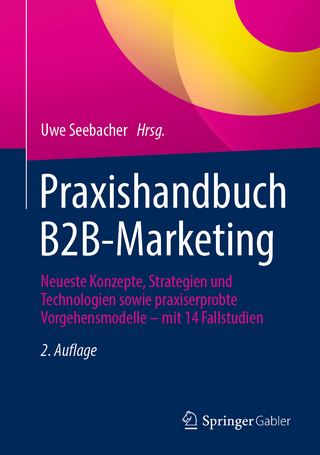
Accelerating Sustainability in Fashion, Clothing and Textiles
Routledge (Verlag)
978-1-032-22519-7 (ISBN)
The issue of sustainability is characterised as a ‘wicked problem’ in the fashion, clothing and textiles sector and is now coming into increased focus due to growing consumer, business and policy pressures. This in-depth volume presents a comprehensive overview of the challenges and emerging opportunities faced by the sector, and provides strategic solutions as to how the sector can substantially accelerate sustainability.
This book collates research and industry best practice to provide a ‘one-stop shop’ exploring the complex and interconnected issues surrounding sustainability in fashion, clothing and textiles. The practical and digestible chapters include innovative examples and perspectives from different regions of the globe, addressing topics from policies to supply chain issues and materials innovation. Five unique case studies of sustainable businesses provide detailed examples of pioneering practice. Edited by three professionals with long-standing knowledge and expertise, the book takes a global perspective with examples that illustrate the scale and breadth of topics and regions in the scope of sustainability. This holistic approach brings together both academic and industry perspectives on the critical areas that require immediate action to move towards a more sustainable fashion, clothing and textile sector.
This is an invaluable resource for those working in the industry, policymakers and for those in business or academia with an interest in sustainability in fashion, clothing, textiles and related sectors worldwide. It is also relevant to professionals and students in the areas of sustainability, innovation, supply chains, design and development, consultancy, education and training.
Martin Charter is Professor of Innovation and Sustainability and Director at the University for the Creative Arts. He has worked on sustainability and innovation issues for 35 years and is the author/editor of numerous publications. Martin is a fellow of the Royal Society of Arts and Clean Leadership Growth Network. Bernice Pan is an award-winning design entrepreneur, speaker and author, combining vision, theory and practice. She founded DEPLOY in 2006 to reform fashion sector; in 2022, the company received B Corp status. Sandy Black is Research Professor and design educator in the Centre for Sustainable Fashion, London College of Fashion, University of the Arts London. As a pioneering author of numerous book titles on fashion and sustainability, Sandy works to catalyse sustainable fashion and textiles practices and sustainable prosperity.
1. Introduction PART I Fashion system landscape 2. Overview 3. The Wicked Problem PART II Policy and standards 4. Global policy covering sustainability in fashion and clothing: a review and implications 5. Traceability, transparency and greenwashing: highlighting growing drivers for traceability and transparency in the sector, and emerging challenges surrounding greenwashing of garments 6. Using textile testing information to ensure garment quality, longevity and transparency PART III Business and innovation 7. Finance and funding for upscaling sustainable fashion 8. Managing sustainable innovation 9. Fostering sustainable practices: the case of micro and small designer fashion enterprises PART IV Case studies: values-based entrepreneurs 10. Desserto®: cactus fibre as leather substitute 11. DePloy: customisation for 360° sustainability 12. TOBEFRANK: transparency in practice 13. MUD Jeans: denim with circularity 14. SXD: working with cliate refugees PART V Consumers, culture and ecosystems 15. Clothing 2050: garment scenarios to drive circular material systems 16. Shifting the needle: can we build the next generation of consumer activism and advocacy for sustainable fashion? 17. Crafting connections with clothing: values, influence and relationships 18. Unheard voices: reclaiming fashion sustainability 19. Regions, communities, and localism PART VI Circular economy 20. Circular economy in the textile and apparel sector: an overview of global trends, challenges and opportunities 21. New forms of governance to accelerate circular textiles in the Netherlands 22. Accelerating circularity in textiles: lessons learned from a regional perspective 23. Biomimicry, biomaterials and textiles 24. Reincarnation: waste, reuse, repair and upcycling PART VII Education 25. Curriculum: challenges, opportunities, and approaches to increasing sustainability content in fashion and textiles education 26. Methodologies and tools: incorporating sustainability content in fashion, apparel and textiles educational curriculum through facilitating materials 27. The use of digital pedagogies for accessible and equitable teaching and learning of fashion design for sustainability: a case study PART VIII Future and technology 28. A pathway towards future sustainable fashion in 2030 29. Risky business: sustainable fashion through new technologies 30. Wearable tech, virtual fashion, and immersive technologies 31. Fashion ex machina: human–machine collaboration to support sustainability through customized design and production 32. Conclusion: progress, challenges and prospects
| Erscheinungsdatum | 28.09.2023 |
|---|---|
| Zusatzinfo | 15 Tables, black and white; 36 Line drawings, black and white; 41 Halftones, black and white; 77 Illustrations, black and white |
| Verlagsort | London |
| Sprache | englisch |
| Maße | 156 x 234 mm |
| Gewicht | 453 g |
| Themenwelt | Wirtschaft ► Betriebswirtschaft / Management ► Marketing / Vertrieb |
| Wirtschaft ► Betriebswirtschaft / Management ► Unternehmensführung / Management | |
| Wirtschaft ► Volkswirtschaftslehre | |
| ISBN-10 | 1-032-22519-X / 103222519X |
| ISBN-13 | 978-1-032-22519-7 / 9781032225197 |
| Zustand | Neuware |
| Haben Sie eine Frage zum Produkt? |
aus dem Bereich


